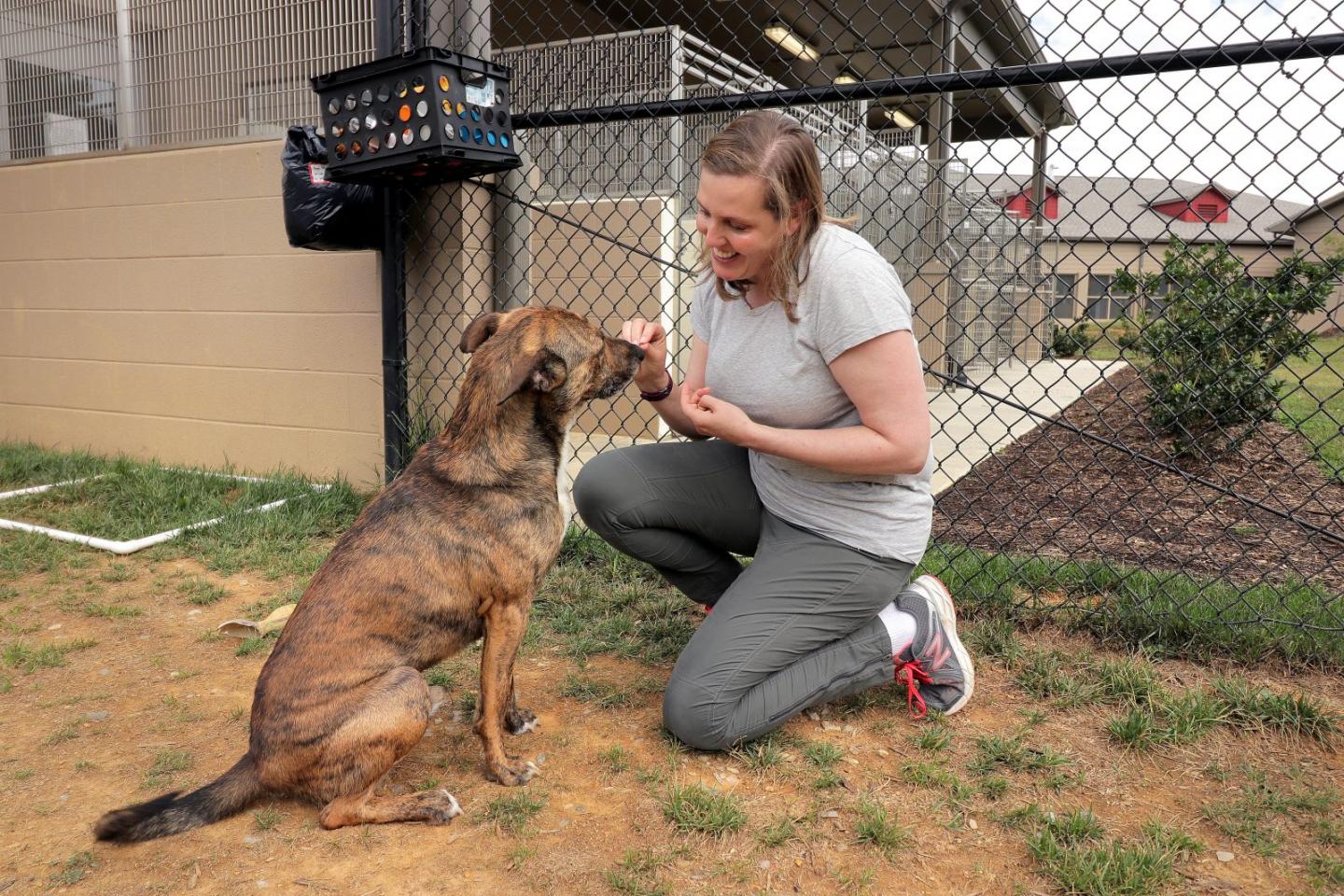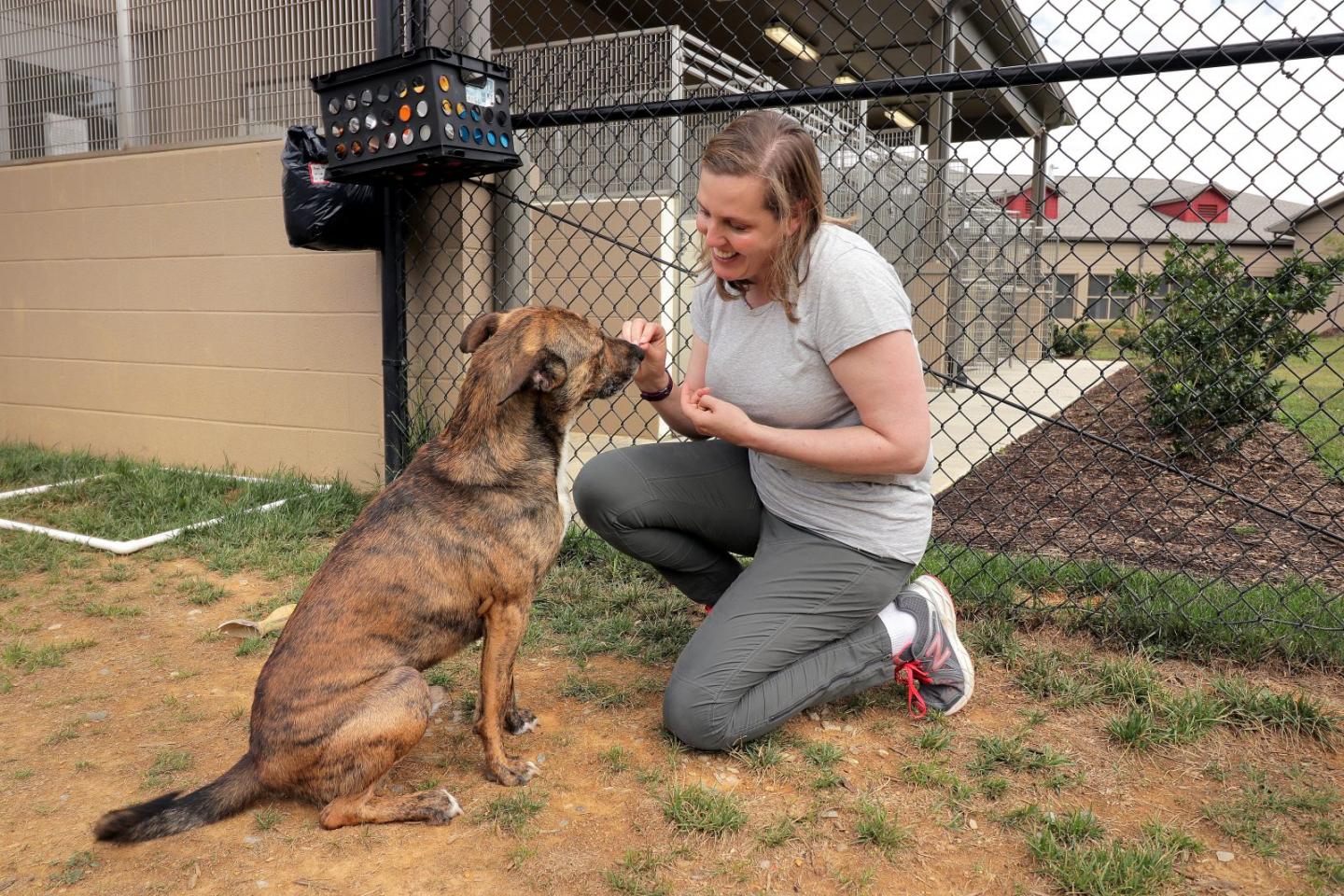
Credit: Virginia Tech
When separated, they've been known to travel thousands of miles to reunite with their human families. Their companionship alleviates loneliness and can bestow myriad health benefits. They share our joys, our sorrows, and our sofas, offering abiding support and partnership through all that life offers. Their love is unconditional, and their significance to humans, indisputable.
Much has been written about the benefits that dogs bring to our lives. Erica Feuerbacher's mission is to help humans make life better for dogs.
That mission is about to take flight.
Video: https://video.vt.edu/media/Helping+shelter+dogs+shed+their+stress/1_u1b3gq0r
Feuerbacher, an assistant professor in the Virginia Tech College of Agriculture and Life Sciences, and a team from Arizona State University received a $1.7 million grant from Maddie's Fund, an animal welfare organization. The team, which includes ASU's Lisa Gunter, who is Maddie's research fellow, and Clive Wynne, professor of psychology, will work with approximately 100 shelters to evaluate three types of fostering: check-outs from shelters, brief sleep-overs, and traditional foster experiences.
The three-and-a-half-year funding opportunity will allow Feuerbacher, aided by a graduate student and a research assistant, to allocate her portion of the grant to work closely with 50 animal shelters along the East Coast. Her goal is to explore how to foster dogs most effectively. This large-scale fostering study builds on previous research, also funded by Maddie's, showing that just one night away from a shelter decreased dogs' stress levels. Maddie's Fund is a national family foundation established by Dave and Cheryl Duffield to revolutionize the status and well-being of companion animals.
Feuerbacher is an expert in anthrozoology, the study of human-animal bonding. The Department of Poultry and Animal Sciences researcher began working for the college last winter, and is developing a research program that will explore human-dog interactions and training techniques for dogs.
"I really love working with dogs and helping them," said Feuerbacher, who is also a Virginia Cooperative Extension specialist. "My work is applied, and I can help people who want to help dogs. I hope that through this grant, I can have a broader influence."
"Parent" to a brood that includes Ninja, a pit bull cross; Lorek, a German shepherd; Aegis, a Belgian malinois; two feline leukemia-positive cats; and Magic, an appaloosa/percheron gelding, the life-long animal lover and expert's work is guided by the question: How can we be better for dogs?
"There used to be a view that fostering meant you took the dog out permanently from the shelter. Not everyone can have a dog for an endless amount of time," said Feuerbacher. "How do we make this feasible for a shorter time?"
The shelter environment poses challenges to dogs in need of uninterrupted sleep. This is where short-term foster experiences come in. Anecdotal reports show that when shelter dogs are taken to homes overnight, after an initial period of restlessness, they are able to sleep for hours. Feuerbacher outfits them in a device similar to a fitbit that monitors heart rate and other vitals.
"Little tweaks can make such a big difference," she said. "With the grant, we will be able to recruit shelters. They will receive training support. We want to help them tailor their services to their dogs' needs."
Some shelters are beginning Weekend Warrior programs that allow volunteers to take dogs home for a night or two, providing the animals with a break.
"It's like us having a weekend where we can return to work refreshed," said Feuerbacher. "For the volunteers, it's meaningful, but it still fits in within their time limits."
Best of all, Feuerbacher's data show animals are not more stressed when they are returned to shelters. Her anecdotal reports suggest that the animals return to the shelter in a more settled state.
"We see some lovely transformations in the dogs. Sometimes you get a dog that is shut down in the shelter, and you get them home and they are goofy and fun. It really helps them get adopted," said Feuerbacher. "And, the volunteers become invested. They become advocates for dogs in the community."
Feuerbacher believes that programs focused on the well-being of the dog have greater ramifications for the animal's adoption prospects. They also serve to raise greater awareness about opportunities for adoption.
"Our view of dogs is morphing a bit. They have a mutation of what in humans is called Williams syndrome," said Feuerbacher. "The syndrome is partially characterized by hypersociality. They are able to form multiple, close relationships. So, this is good news for fostering. They can have multiple best friends at different times."
###
Shelters that join the study will receive foster program training and implementation support from Maddie's Fund. The researchers from ASU and Virginia Tech will collect data about the impact of fostering on outcomes like adoption and length of stay and how these programs affect staff and volunteers who work in the shelters. Shelters interested in learning more and in signing up may visit goo.gl/forms/hlk0vuM0eg20KaXy1.
To learn more about this project, take a look at this ASU video: youtu.be/AJYBRKmChcY.
Media Contact
Zeke Barlow
[email protected]
540-231-5417
@vtnews
http://www.vtnews.vt.edu
Original Source
https://vtnews.vt.edu/articles/2018/11/cals-dogshelter.html





